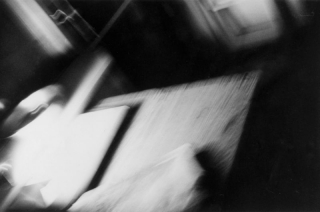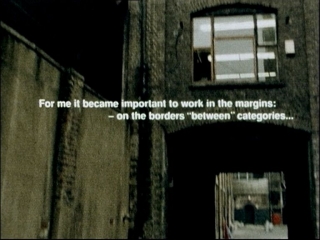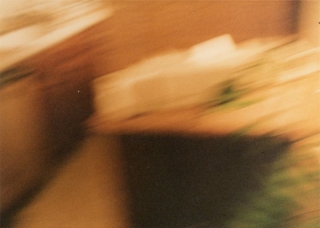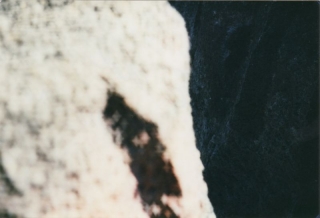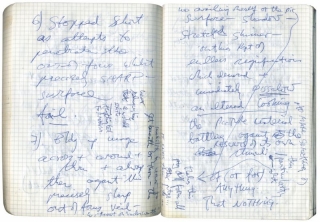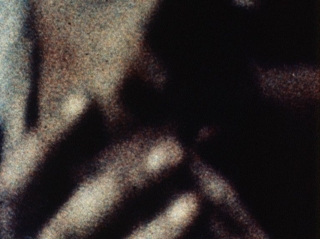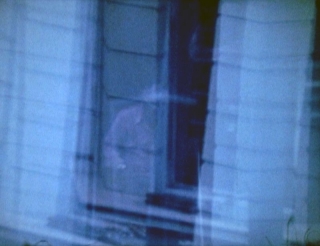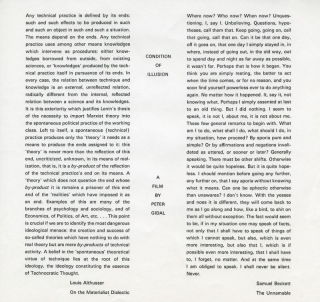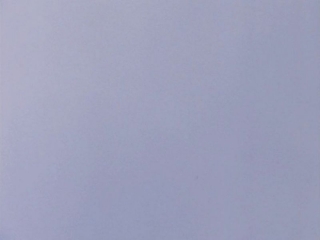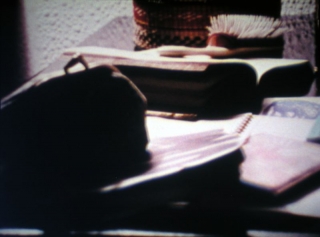Date: 16 March 2016 | Season: Peter Gidal: Flare Out
PETER GIDAL: CLOSE UP
Wednesday 16 March 2016, at 7pm
Newcastle AV Festival at Northern Carter
This rare screening of Peter Gidal’s ‘feature length’ film Close Up (1983) anticipates the publication of Flare Out: Aesthetics 1966–2016, a collection of essays by one of film’s great polemicists. Gidal was a central figure during the formative years of the London Film-Makers’ Co-operative, whose 50th anniversary is being celebrated throughout 2016, and made some its most radical works. His cinema is anti-narrative, against representation and fiercely materialist. In Close Up, Gidal’s political, ultra-leftist practice is augmented by the disembodied voices of Nicaraguan revolutionaries heard of the soundtrack.
Peter Gidal, Close Up, 1983, 70 min
The programme will be introduced by Mark Webber.
PROGRAMME NOTES
PETER GIDAL: CLOSE UP
Wednesday 16 March 2016, at 7pm
Newcastle AV Festival at Northern Carter
CLOSE UP
Peter Gidal, 1983, 16mm, colour, sound, 70 min
“After three years this film, attempting yet again to deal with the problematizing of filmic representation in sound and image: the overtly politically-polemical soundtrack from Nicaragua must not synchronise with, nor must it find a separate continuum of reality away from, the image sequences.
“Without avoiding the interrogation of narrative/anti narrative cinematic structures (the way the images, and the sounds, at times hold/do not hold … or the way they attempt to force a position contradictory to any representational imaginary or homogeneity, of constructed space, time, ego, language, film) an attempted materialist use of sound and image must be at the same time an anti-individualist work.
“Both the sound-contradictions, and the image-contradictions, of subjectivity in this film (and of this film) must be in constant process with/against the political polemic: the film can not allow for a final exclusion of either (neither some pure documentary reality nor some pure formal dialectic). The viewer’s attempts, via her/his/the cultural context of meaning making (political/sexual, narrative) are worked against by the film’s process. The work against the capitalist patriarchal position of narrative, in other words, is (still, and in specificity) the main interest.”
—Peter Gidal, August 1983
Back to top
Date: 14 April 2016 | Season: Peter Gidal: Flare Out
PETER GIDAL: FLARE OUT — SCREENING AND BOOK LAUNCH
Thursday 14 April 2016, at 7pm
London Tate Britain
A screening of four films by Peter Gidal to celebrate the publication of Flare Out: Aesthetics 1966–2016, a collection of his essays on film, art and aesthetics. Gidal was a central figure during the formative years of the London Film-Makers’ Co-op and made some its most radical works. His cinema is anti-narrative, against representation and fiercely materialist, and his writings are similarly polemical and unique. This programme of films from the 1960s to the present includes his most recent work, and will be introduced by Mark Webber and Peter Gidal.
Peter Gidal, Assumption, 1997, 1 min
Peter Gidal, Key, 1968-69, 10 min
Peter Gidal, Kopenhagen/1930, 1977, 40 min
Peter Gidal, not far at all, 2013, 15 min
“He draws out singularities. He allows the camera only a fenced in area, piecemeal. He lets the gaze hold on objects and constantly repeats … this permits the possibilities of the discrepancies between one’s own seeing and seeing with the camera to become distinct, and this in turn allows for a completely different experience of the surroundings.” (Birgit Hein)
Flare Out: Aesthetics 1966–2016, edited by Mark Webber and Peter Gidal, is published by The Visible Press.
PROGRAMME NOTES
PETER GIDAL: FLARE OUT — SCREENING AND BOOK LAUNCH
Thursday 14 April 2016, at 7pm
London Tate Britain
ASSUMPTION
Peter Gidal, 1997, 16mm, colour, sound, 1 min
Assumption features glimpses of life at the London Film-Makers’ Co-op; but is more than a potted history of an organisation. It pays tribute to Mary Pat Leece, a founding member of Four Corners Film Workshop and a teacher at Chelsea and Saint Martins Schools of Art, one of the true innovators of the independent film sector. With its virtuoso editing, voice-overs and scrolling titles, it works as a densely-plotted celebration of independent film culture at the end of the 1990s.
KEY
Peter Gidal, 1968-69, 16mm, colour, sound, 10 min
A slow zoom-out and image dissolve (defocus) of … (+feedback sound).
KOPENHAGEN/1930
Peter Gidal, 1977, 16mm, b/w, silent, 40 min
Kopenhagen/1930 presents a different attitude to the seductions of content, to the signifying processes that are repressed in the rigorous procedures of the Structural/Materialist film. Its material is ‘images by George Gidal, Copenhagen 1930’: photographs, their grounding and their signification.
NOT FAR AT ALL
Peter Gidal, 2013, 16mm, colour, sound, 15 min
First film in 5 years, tempted to say different yet the same, but not. not far at all’s soundtrack, just for the record, is concrete/abstract without language.
Back to top
Date: 20 May 2016 | Season: Peter Gidal: Flare Out
PETER GIDAL: CLOSE UP
Friday 20 May 2016, at 7:30pm
London Close-Up Film Centre
Peter Gidal and Mark Webber will introduce a screening of Gidal’s ‘feature length’ film Close Up (1983) to coincide with the publication of Flare Out: Aesthetics 1966–2016, a collection of essays by one of film’s great polemicists. Gidal was a central figure during the formative years of the London Film-Makers’ Co-operative and made some its most radical works. His cinema is anti-narrative, against representation, and fiercely materialist.
“Close Up is crystal hard, intransigent, and film in extremis. In short, one of the best ‘political’ films made in this country.” —Michael O’Pray, Monthly Film Bulletin
In Close Up, Peter Gidal’s political, ultra-leftist practice is augmented by the disembodied voices of two Nicaraguan revolutionaries heard of the soundtrack. These voices punctuate a film whose representation of a room, an inhabited space, is one in which the viewer must consciously search for recognition, for meaning-making. The image-content is muted and abstract, but fascinating, with moments of (no-doubt) inadvertent beauty.
Presented in association with LUX.
Date: 25 May 2016 | Season: Peter Gidal: Flare Out
PETER GIDAL: FLARE OUT — SCREENING AND BOOK LAUNCH
Wednesday 25 May 2016, at 7pm
Paris Centre Pompidou
For five decades, Peter Gidal has sought to problematise the film-viewing process by creating works that resist recognition and identification. His practice posits film as a durational experience and negates analysis on psychological grounds. This programme, featuring the seminal film Clouds (1969) and later works Flare Out (1992), Volcano (2002) and not far at all (2013), surveys his radical and unique approach.
Peter Gidal, Clouds, 1969, 10 min
Peter Gidal, Flare Out, 1992, 20 min
Peter Gidal, Volcano, 2002, 30 min
Peter Gidal, not far at all, 2013, 15 min
Gidal has been based in the UK since the late 1960s, and was a central figure during the formative years of the London Film-Makers’ Co-operative. He is a noted writer and polemicist, whose “Theory and Definition of Structural/Materialist Film” is a key text of avant-garde cinema. The screening celebrates the publication of Flare Out: Aesthetics 1966–2016, a collection of Gidal’s essays on film, art and aesthetics, and will be introduced by the filmmaker and editor/publisher Mark Webber.
“Mental activation toward material analysis is the process that is relevant, whether or not actual structure is ‘revealed’.” —Peter Gidal, 1969
PROGRAMME NOTES
PETER GIDAL: FLARE OUT — SCREENING AND BOOK LAUNCH
Wednesday 25 May 2016, at 7pm
Paris Centre Pompidou
CLOUDS
Peter Gidal, 1969, 16mm, b/w, sound, 10 min
The anti-illusionist project engaged by Clouds is that of dialectical materialism. There is virtually nothing on screen, in the sense of in screen. Obsessive repetition as materialist practice not psychoanalytical indulgence. (PG)
FLARE OUT
Peter Gidal, 1992, 16mm, colour, sound, 20 min
Sound: unrecognition unidentified, in time, you hear? Image: recognition identified, out of time in time; not not knowing the unknown but not knowing the known, no trace of ‘no trace of any thing’. e.g. grain: is grain silver, black & white, or colour? Is silver black & white or colour? You see? (PG)
VOLCANO
Peter Gidal, 2002, 16mm, b/w & colour, silent, 30 min
The film attempts to deal with those questions of representation that persist as problematic, for me, for the basic questions of aesthetics, what it is to view, how to view the unknown, as to view the known is not possibly a viewing. The question of recognition, the impossibility of recognition or, better said, the impossibility of a viewer viewing at all if it is predicated upon recognition … At that moment, you the viewer I the viewer am no longer part of a process, a material however metaphysical or not process of making meaning through the conflicts of perception of something … In Volcano light’s afterimage, the shot of light after image, becomes as obliterative as dark’s … Thereby the temporal break caused by transparent leader, and by black leader, becomes differently spatial and temporal, as to the “something missing”… (PG)
not far at all
Peter Gidal, 2013, 16mm, colour, sound, 15 minutes
First film in 5 years, tempted to say different yet the same, but not. not far at all’s soundtrack, just for the record, is concrete/abstract without language. (PG)
Back to top
Date: 7 October 2016 | Season: Peter Gidal: Flare Out
INTRODUCTION TO PETER GIDAL 1
Friday 7 October 2016, at 9pm
Brussels Cinematek
Introduced by Peter Gidal and Mark Webber
From his first period (Clouds, 1969) to his latest film (not far at all), through Flare Out, the 1992 film that gives the recent book from The Visible Press its title, Gidal frames empty skies and a volcano to question, by the means of film, what the viewer believes he sees and “[to pose] the basic questions of aesthetics, what it is to view, how to view the unknown as to view the known is not possibly a viewing.” —Olivier Dekegel
Peter Gidal, Clouds, 1969, 10 min
Peter Gidal, Flare Out, 1992, 20 min
Peter Gidal, Volcano, 2002, 30 min
Peter Gidal, not far at all, 2013, 15 min
Date: 8 October 2016 | Season: Peter Gidal: Flare Out
INTRODUCTION TO PETER GIDAL 2
Saturday 8 October 2016, at 3pm
Brussels Cinematek
Introduced by Peter Gidal and Mark Webber
Two short and one medium length film from Peter Gidal’s first period. A very famous folk singer of the time is invoked, incognito (Key) but – above all – many elements of the film language (editing and jump-cut, repetition, duration, zoom, focus, blur, etc.) are used to question film, and our gaze. Jonas Mekas was an admirer of Room Film 1973: “I was particularly impressed with Gidal’s film, which from what I’ve seen may be his best to date. Very subtly and very plastically it deals with light. The film is uncompromisingly rigid in its minimality of action. A very beautifully realised piece of work […] It is denitely contemporary in feeling and substance. It is one of the best lms to come out of the London School.” —Olivier Dekegel
Peter Gidal, Hall, 1968-69, 10 min
Peter Gidal, Key, 1968-69, 10 min
Peter Gidal, Room Film 1973, 1973, 46 min (at 18fps)
Date: 9 October 2016 | Season: Peter Gidal: Flare Out
INTRODUCTION TO PETER GIDAL 3
Sunday 9 October 2016, at 4pm
Brussels Cinematek
Introduced by Mark Webber
From C/O/N/S/T/R/U/C/T, shown in Knokke, to the diptych Coda I + Coda II in 2013, in which the filmmaker uses a recording of the voice of William Burroughs, we get an overview of Gidals structural/materialist cinema, that refuses a ‘subject-centred image’ and is resolutely ‘anti-voyeuristic’. As for Assumption, it offers an approach to life at the London Film-Makers’ Co-op which goes beyond the history of an organisation and includes a tribute to Mary P. Leece, founder of the Four Corners film workshop. —Olivier Dekegel
Peter Gidal, Assumption, 1997, 1 min
Peter Gidal, Epilogue, 1978, 9 min
Peter Gidal, C/O/N/S/T/R/U/C/T, 1974/2016, 13 min
Peter Gidal, Condition of Illusion, 1975, 30 min
Peter Gidal, Coda I, 2013, 2 min
Peter Gidal, Coda II, 2013, 2 min
Screening repeats Monday 10 October, at 6pm
Date: 23 October 2016 | Season: Peter Gidal: Flare Out
PETER GIDAL: FLARE OUT
23—24 October 2016
New York Anthology Film Archives
“He draws out singularities. He allows the camera only a fenced in area, piecemeal. He lets the gaze hold on objects and constantly repeats … this permits the possibilities of the discrepancies between one’s own seeing and seeing with the camera to become distinct, and this in turn allows for a completely different experience of the surroundings.” (Birgit Hein)
For five decades, Peter Gidal has sought to problematize the film-viewing process by creating works that resist recognition and identification. His practice posits film as a durational experience and negates analysis on psychological grounds. These two programs survey his radical approach, ranging from the seminal early works Hall and Clouds (1969) to the recent Coda I, Coda II and not far at all (2013).
Gidal has lived in the UK since the late 1960s and was a central figure during the formative years of the London Film-Makers’ Co-operative. He is a noted writer and polemicist, whose “Theory and Definition of Structural/Materialist Film” is a key text of avant-garde cinema.
Following the recent publication of a collection of Gidal’s essays, Jonathan Rosenbaum commented: “The singular way that Peter Gidal wrestles with language is a continual lesson in philosophy, aesthetics, ideology, and politics. Flare Out: Aesthetics 1966–2016 charts his ongoing struggles with wit, lucidity, and genuine brio.”
Flare Out: Aesthetics 1966–2016, edited by Mark Webber and Peter Gidal, is published by The Visible Press. In addition to many texts relating to film, it also includes essays on the work of Samuel Beckett, Thérèse Oulton, Gerhard Richter and Andy Warhol.
Date: 23 October 2016 | Season: Peter Gidal: Flare Out
PETER GIDAL: FLARE OUT PROGRAM 1
Sunday 23 October 2016, at 8:15pm
New York Anthology Film Archives
“Manipulation of response and awareness thereof: through repetition and duration of image. Film situation as structured, as recorrective mechanism.” (Peter Gidal, 1969)
The early film Hall presents a fixed view across a space of indeterminate depth that is continually disrupted by jump cuts and repeats. Despite the incessant ringing of (what may be) a doorbell, it is one of Gidal’s more accessible works. By the mid-1970s, the profilmic event had been entirely thrown into question. Variations in camera movement, lighting, exposure, focus, zooms, shot duration, repetition, and filming from photographs (rather than ‘reality’) were established as methods through which identification of/with an image could be negated. In Condition of Illusion the image remains unstable until the final section, a scrolling text with extended quotes from Althusser and Beckett. Other works do not contain similarly readable content: Flare Out is “out of time in time; not not knowing the unknown but not knowing the known, no trace of ‘no trace of any thing’,” the Codas (commissioned by Frieze, snatches of Burroughs on the soundtrack), “a complex of barely visible cuts in space and time, the opposite of erasure, but nothing so much as visible.”
Peter Gidal, Hall, 1969, 16mm, color, sound, 10 min
Peter Gidal, Condition of Illusion, 16mm, color, silent, 1975, 30 min
Peter Gidal, Flare Out, 1992, 16mm, color, sound, 20 min
Peter Gidal, Coda I, 2013, 16mm, color, sound, 2 min
Peter Gidal, Coda II, 2013, 16mm, color, sound, 2 min
Date: 24 October 2016 | Season: Peter Gidal: Flare Out
PETER GIDAL: FLARE OUT PROGRAM 2
Monday 24 October 2016, at 7pm
New York Anthology Film Archives
“Mental activation toward material analysis is the process that is relevant, whether or not actual structure is ‘revealed’.” (Peter Gidal, 1969)
Clouds was the first real manifestation of Gidal’s anti-illusionist project, a film in which “There is virtually nothing on screen, in the sense of in screen. Obsessive repetition as materialist practice not psychoanalytical indulgence.” Assumption is, by stark contrast, exhilarating viewing. One of the densest minutes of all cinema, the screen bristles with recognizable images, fleeting texts and snatches of dialogue in tribute to filmmaker/activist Mary Pat Leece. Silent Partner and Epilogue return to the more familiar territory of domestic interiors, inhabited spaces interrogated by a restless camera. Anti-narrative, against representation, militant and uncompromising, yet despite themselves, strangely compelling. After a hiatus from filmmaking, Gidal returned in 2013 with not far at all: “tempted to say different yet the same, but not.” The film was awarded the L’age d’or Prize at the Brussels Cinematek in 2015.
Peter Gidal, Assumption, 1997, 16mm, color, sound, 1 min
Peter Gidal, Clouds, 1969, 16mm, color, sound, 10 min
Peter Gidal, Silent Partner, 1977, 16mm, color, sound, 35 min
Peter Gidal, Epilogue, 1978, 16mm, color, silent, 7 min
Peter Gidal, not far at all, 2013, 16mm, color, sound, 15 min
